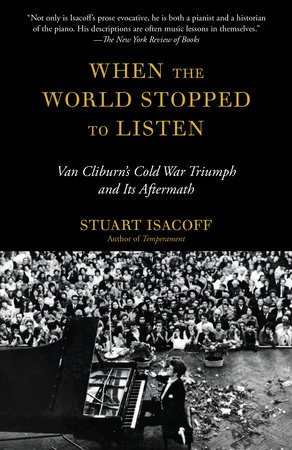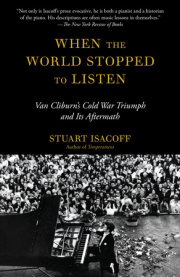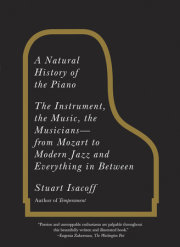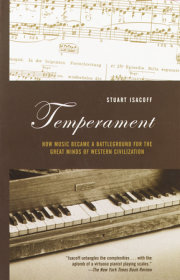The Land of Snow and Spies
OPENED IN 1956 as a symbol of friendship between the Soviet Union and China, the Pekin Hotel—“heavily ocher in color, both the stone outside and the pillared lobby, and used to house privileged, usually Communist visitors,” remembered
New York Times correspondent Max Frankel—featured high ceilings and spacious rooms, stucco moldings, and wood-and-marble interiors (but surprisingly tiny, cramped elevators). The Pekin quickly became one of the city’s most elite locations. It also garnered a reputation as “the KGB hotel,” a tag borne out by the hall monitors who took notes on everyone’s comings and goings, along with the listening devices people were forever uncovering in their quarters.
Pianist Evelyne Crochet stumbled across one while trying to use a hair dryer. “I had trouble plugging it into the wall,” she explained, “so I opened the electrical panel and found a microphone hidden there. I started saying really silly things, bad words, like ‘shit’ in Russian. And I announced loudly, ‘Look at this . . . a microphone!’ My roommate, another French girl, was laughing uncontrollably.” She was not alone. At the Hotel Metropol, which housed the jurors, the French judge, Armand de Gontaut-Biron, stood on a chair nightly and cursed at the chandelier after recognizing a microphone hidden among the glistening crystals. How well the Russian eavesdroppers understood his colloquial French is another question.
Some Westerners took the intense scrutiny of their Soviet hosts as a call to action. “As a young girl, I was very playful and made a game of losing my minders,” says Crochet. As she walked from the hotel to the conservatory to practice, she noticed several little alleys along the way. One day she ducked into one, entered a bicycle store, and left through a different exit, losing the man who was following her. When she arrived back at the hotel that night, an official contingent was waiting.
“ ‘You cannot do that,’ I was told. ‘It’s dangerous.’ I countered with, ‘Is it dangerous to live in Russia? What’s so dangerous about it?’ ” Nothing much happened as a result, she says. But there was a feeling of secrecy everywhere, “and a lot of suspicion
between people.”
Participants from free societies found themselves herded, scru-tinized, and sometimes tricked by a shadow force, like ancient Athenians in the grip of their invisible gods. If the inhabitants of that long-ago empire felt bludgeoned by mighty Poseidon or roiled by mischievous Erinyes, here the ever-present agents of influence resided not on Mount Olympus but in the Kremlin.
Crochet received special attention. “We all had an assigned ‘translator,’ ” she recalls. “I knew a little Russian, so they were suspicious of me immediately. They thought it was strange that I had a good accent, so I was always followed.” For the Soviet authorities, not a thing went unnoticed. At a Kremlin reception, Khrushchev stopped in front of her and asked why she spoke Russian. She was flabbergasted that he knew. “Then he asked me for the name of the French woman who had a friendship with Lazar Berman—the one he would later marry.” Khrushchev often overstepped personal boundaries in a way that verged on rudeness, even with people he liked. The rotund Soviet leader grilled jury member Sequeira Costa about his slight build—“Tell me,” he demanded, “do you suffer from hunger in Portugal?”— just as he would later grill Van about his height.
Annie Marchand had an even more troubling experience. She met and became friends with a violist in Moscow who spoke French. They went out a lot. He took her to the Bolshoi The-ater and they visited his friends. The Soviets reached out to the French government and asked them to put an end to the rela-tionship. Soon she got a phone call from the secretary of the French ambassador asking about her intentions. Her friend was from a very prominent Communist family, she was told, and the Soviets would be very upset if they chose to marry.
Journalists, keenly aware of being followed, sometimes engaged in games like Crochet’s hide-and-seek. From the files of the American embassy a report from August 1958 tells of a cor-respondent with a reputation as a man-about-town who often managed to shake the surveillance team that followed him on his social escapades. “On one occasion he returned to his car with his date to find the tires riddled with nails,” it said. The man hailed a taxi and offered the driver one hundred rubles to elude the car that was following them, which, he claimed, was being driven by the lady’s husband. After the driver had successfully lost the tail, the newsman paid him and offered thanks for sparing them the husband’s wrath. “The driver retorted with a smile, ‘You mean all three of them.’ ”
As the pianists settled in to their hotels, frustration mounted. “People were nice, but the service was lousy,” said Costa of the Metropol’s restaurant. He sat at a table in the dining room for no less than forty minutes, waiting for a waiter to show up. He knew a little Russian at the time, and asked what was going on. “Oh, this table doesn’t work,” was the reply. He later learned there was a special dining room for the jury—huge and noisy, with a band playing fox-trots and tangos, where “everyone was smoking terrible cigarettes. And it took more than two hours for the food to arrive.”
Truman Capote had a similar experience in a Leningrad hotel three years earlier, when he was traveling with the American company of
Porgy and Bess. The service was minimal, he found,
and the ambience strange: on the dance floor were couples who seemed gripped by fantasies of a forbidden world brought on by the strains of the American jazz being played. “Madame Ner-vitsky danced well,” Capote wrote of one patron, “but her body was tense, her hands icy. ‘
J’adore la musique des Nègres. It’s so
wicked. So vile.’ ”
The Pekin’s attractiveness rested partly on the professed avail-ability of the traditional flavors of China in its dining room
(a later incarnation of the place announced such delicacies as “jugged hare,” and “braised pig’s trotters in pimiento sauce”), but
none of the Tchaikovsky pianists ever got a whiff of such culinary exotica. “The food was mediocre,” noted Marchand, “and there was little to be had, except for plenty of caviar and black bread.” She would often sit for twenty minutes before a waiter peeled himself away from the wall and started ladling some kind of cab-bage soup. Even the seemingly endless mounds of caviar were not to everyone’s liking. “I didn’t care for it,” recalls Dodi Ashkenazy, the Icelandic competitor who later married Vladimir. “So I gave all of my caviar to Van.”
In fact, Western visitors found the hotels seriously wanting. When first opened in 1907, the luxurious Metropol was the only lodging in Moscow to offer hot water, refrigerators, and elevators. It served for a while as an official residence of the All-Russian Central Executive Committee after the Revolution of 1917. By the 1930s, it was again attracting sophisticated guests, including such luminaries as George Bernard Shaw and Bertolt Brecht. But by 1958, things had deteriorated dramatically—even the plumb-ing had become a serious issue.
Costa’s wife was shocked by the condition of things. The tub in the bathroom was almost black, so she filled it with alcohol as a disinfectant, and then lit it all on fire. “The people from the floor—on each floor they had special KGB people taking care of things—came running,” says Costa. “The Russians weren’t crazy about this, and not just because of the danger of fire. There was a lot of cueing up for goods, with long lines everywhere. They were upset that we lit the alcohol on fire instead of drinking it. In their view, my wife was wasting a valuable asset.”
Some pianists began to make close observations on their own of the dynamics of everyday life in Moscow. Crochet was shocked to see, on the streets, that most of the heavy work— fixing the pavement, driving trucks—was done by women. “Where else did that happen?” she asked. “It was a sight to see.” In that respect at least, the culture seemed more advanced than that in the West. But they were way behind in so many other ways, she noted. Soviet architecture was ugly, “as if deliberately meant to depress people, though the monuments—and historic places like Lenin’s Tomb, and Red Square—were beautiful.”
She found that people hungered for something better. “Some-one approached me and asked, ‘Will you sell me your coat?’ But I didn’t have a fancy coat—my sister had lent it to me for the trip. It was very light, and the climate was so cold—when I went out-side, ice formed in my nose.” Roger Boutry also attracted atten-tion with his garment. “Nearly everyone wore a black overcoat,” he remembers, “and I had one of camel hair. People thought it was quite special, and they wanted to touch it.”
The interest in Western clothing was telling. Marchand recalled going to Moscow’s biggest department store, GUM, in search of a souvenir, and finding nothing there except shoes made in Bulgaria that seemed to be constructed of cardboard. Yet in the special section reserved for important Party members, the shelves were full. “The people at the top had absolutely every-thing they wanted,” she noted.
Officials hewed to the Party line, consistently asserting Soviet superiority. Crochet was taken out to a Georgian restaurant and presented with a glass of champagne—as if she’d never heard of the refreshment before. She pointed out that it came from France. “They had no idea, and thought it was a Russian term.” That was a logical assumption when the official position was that all good things had to have come from the homeland.
However, the warmth and the yearning of the Russians were palpable, remembered Crochet. “They were easily moved, and cried a lot [at musical performances]. You had to take that with a grain of salt—it was their character. I came from France, where we analyze our thoughts.” For Paris-raised Crochet, life was a rational argument. In Russia, where strong emotions were the coin of the realm, life was a broken heart.
Nevertheless, laughter could bubble up from beneath the sur-face. A standing joke in Odessa involved a barber who was asked why he always talked politics. “Because,” came the answer, “it is easier to cut your hair when it’s standing on end.”
American pianist Misha Dichter, who nearly won the Tchaikovsky Piano Competition in 1966, was at a party with his pia-nist wife, Cipa, at Lev Vlassenko’s Moscow apartment in 1969 or 1970. On the piano was a special commemorative edition of Beethoven’s “Appassionata” Sonata, which was known to be Lenin’s favorite piece. “I looked at the music and saw that the fingerings”—editorial markings indicating which finger to use on particular notes—“were so perverse that a pianist would have to play the music by positioning himself upside down,” remem-bers Dichter. “ ‘Maybe they were Lenin’s fingerings,’ Cipa com-mented, in full hearing of the crowd. Some muffled laughter erupted at the remark, but the partygoers all held themselves in check,” recalls Dichter. “Afterward, though, people would come up to us on the street, giggling and saying, ‘We heard about Cipa’s comment on Lenin’s fingering!’ Then they would burst into laughter. It went on for days.”
Copyright © 2017 by Stuart Isacoff. All rights reserved. No part of this excerpt may be reproduced or reprinted without permission in writing from the publisher.









